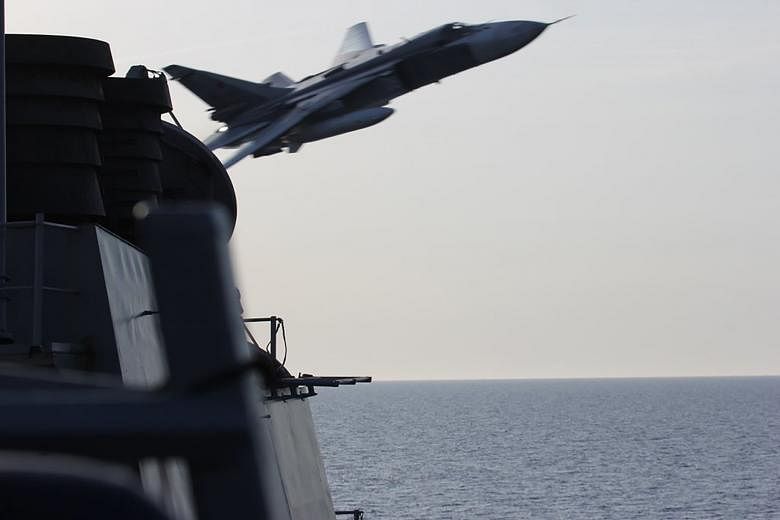LONDON • A Russian fighter aircraft recently flew less than 15m from the wing tip of a United States reconnaissance plane over the Baltic Sea, according to the US military.
It wasn't an isolated incident, coming just days after Russian aircraft last week repeatedly buzzed the USS Donald Cook, an American missile destroyer sailing in the international waters of the Baltic, on the northern approaches of Europe. US Navy Captain Jeff Davis, the Pentagon's spokesman, branded the latest manoeuvre "unsafe and unprofessional" and US Secretary of State John Kerry also joined in the condemnations.
"We are communicating to the Russians how dangerous this is, and our hope is that this will never be repeated," Mr Kerry said, referring to last week's encounters.
But the expectation among Western intelligence analysts is that Russia will continue delivering these military pinpricks, largely to underline Moscow's case that Europe will never feel secure if Russia's interests are ignored.
President Vladimir Putin, who has never made any secret of his determination to reclaim his country's status as a global power, ordered his air force to resume Cold War-era patrols worldwide in August 2007, when long-range Russian bombers capable of carrying nuclear weapons suddenly appeared above the US Pacific territory of Guam.
The bombers, Tupolev TU-95s, are propeller-driven gigantic aircraft of 1950s vintage, hardly at the cutting edge of technology. Nevertheless, these old workhorses have spearheaded the recent Russian military intervention in Syria and are now a familiar sight in Europe's skies.
 A US Navy picture shows a Russian Sukhoi SU-24 aircraft flying past the USS Donald Cook in the Baltic Sea on April 12. PHOTO: REUTERS
A US Navy picture shows a Russian Sukhoi SU-24 aircraft flying past the USS Donald Cook in the Baltic Sea on April 12. PHOTO: REUTERS
Still, the latest Russian military moves against the US Navy are very dangerous. Russian jets came within 9m of the Donald Cook just as it was practising helicopter landings and refuelling. The ship's commanders had no way of knowing what the Russian jets intended or whether they were armed, so the buzzing carried high risks of an accidental confrontation.
The Russians explain that they are merely responding to the American military presence only 70km from the strategically sensitive naval bases in the Kaliningrad region, on the Baltic coast, where Russia recently installed sophisticated new air defence batteries.
Yet in all likelihood, Russia pursues a broader strategic purpose. The US navy was present in the Baltic Sea last week as part of a major exercise designed to test the procedures which Nato, the US-led military alliance, has for reinforcing its northern European member-states in times of crises. But Mr Putin, who late last year signed off on a new Russian national security strategy which, for the first time since the end of the Cold War in the early 1990s, identifies the US and Nato as direct threats to Russia, is determined to signal to the Americans that they won't be allowed to do as they please in waters which the Soviet Union used to dominate.
The Russians may also be interested in messaging to the former communist countries of Eastern Europe, which were part of the Soviet empire but are now Nato members, that they can't rely on the security guarantee offered by the Americans. Every incident in which US power is being challenged but the US does nothing in return potentially increases the credibility of the Russian claim that the East European nations remain at Russia's tender mercies.
The Russians hope that by buzzing American ships and by pretending to intercept American jets, Washington could be persuaded to reach a deal limiting US presence in areas Russia considers sensitive. Dr Mikhail Alexandrov, a leading expert at the Moscow State Institute of International Relations who often acts as an informal spokesman for the authorities, points out that Russian ships do not come close to sensitive American bases located along the US coast, and that certain "rules of reciprocity" established back during the Soviet era could be revived now in order to prevent further military incidents.
But US officials, who point out that the US military is in Europe at the request of sovereign nations which wish to be defended by Nato, have no interest in reaching such deals with Russia. Instead, at a Nato summit scheduled to take place in the Polish capital of Warsaw in July, US President Barack Obama looks likely to authorise a bigger and more permanent US military presence in the former communist East European countries.
So various accidental military encounters between Russia and the US will continue, regardless of how "reckless" the US considers them.


